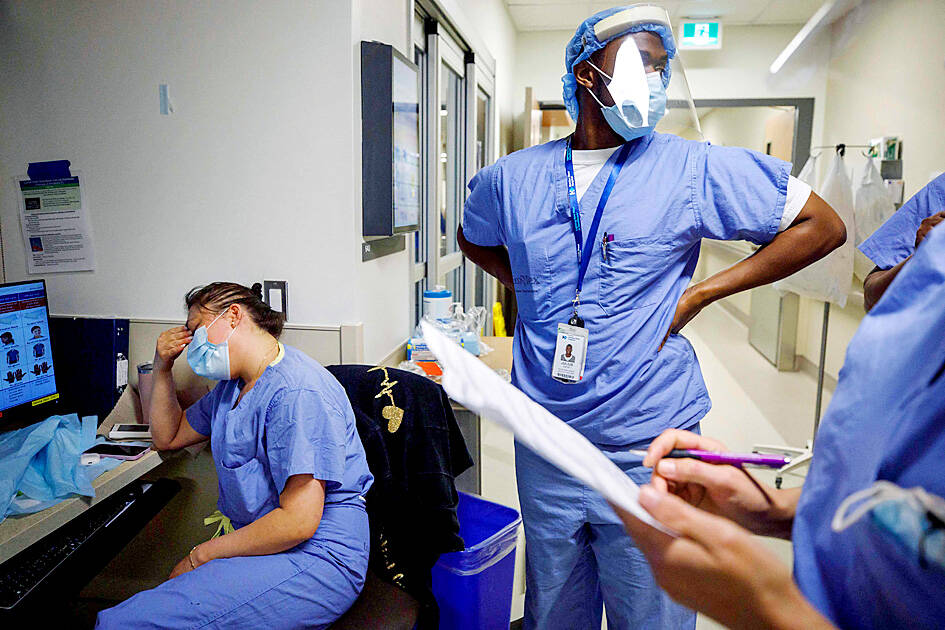An acute nursing shortage is clogging or even closing hospital emergency rooms (ERs) across Canada, pushing an already stressed national health system to the brink with potentially severe consequences for patient care.
Burnout from the COVID-19 pandemic, abuse from patients and salary discontent have seen nursing staff quitting their jobs in droves, and experts say the situation is only likely to worsen.
The impact on emergency care is such that Ottawa police recently had to take a shooting victim to hospital in their squad car, rather than wait for an ambulance, and an elderly woman who fell and broke her hip was forced to wait six hours for help from paramedics based 100km away.

Photo: AFP
Over the summer and into the fall, staffing shortages meant dozens of emergency rooms were forced to close — sometimes for a night or a weekend, sometimes longer.
Wait times to see an ER doctor have soared to 12, 16, 20 hours — or more.
“They’re numb, deflated and feeling hopeless,” Ontario Nurses’ Association president Cathryn Hoy said.
Herself a nurse for 20 years, she described the situation as “critical.”
Amelie Inard, 32, was taken to an ER in Montreal this week, in extreme pain and peeing blood.
The place was packed, and an overwrought nurse told her to describe her condition “in one sentence, really quickly, because of how busy they were,” Inard said.
She eventually left in frustration, without seeing a doctor.
Hospital workloads are rising, Hoy said, along with patients’ exasperation over extended wait times, leading to a spiking of violence against nurses.
Several nurses told reporters that they had been punched, scratched or spat on, and had trays, dishes and feces thrown at them.
In the capital, Ottawa, ambulances were unavailable on more than 1,000 occasions from January to July, as paramedics were stuck waiting to unload patients at crowded ERs.
A hospital in Peterborough, east of Toronto, in the past week was forced to treat patients on gurneys in the parking lot because its ER was full, Hoy said.
In Manitoba, doctor Merril Pauls said there had been “multiple times throughout the summer when we had to shut down beds in the emergency room” at Winnipeg Health Sciences Centre because of the nursing shortage.
On one recent Sunday, “we had too many people coming in and had no place to put them. We literally were double-bunking critical patients in a resuscitation bay,” he said.
It is a “really significant phenomenon going on across the country,” he added.
A recent survey by the Canadian Union of Public Employees, the country’s largest labor union, found that 87 percent of nurses have considered leaving their job “because of the thankless and grueling working conditions.”
“Even new graduates are quitting,” Hoy said.
Canadian Minister of Health Jean-Yves Duclos has vowed to make it easier for foreign credentials to be recognized. That could help 11,000 internationally trained doctors and nurses get jobs in their field in Canada.
However, that would not be nearly enough, with 34,400 nursing positions vacant, according to government data.

BOMBARDMENT: Moscow sent more than 440 drones and 32 missiles, Volodymyr Zelenskiy said, in ‘one of the most terrifying strikes’ on the capital in recent months A nighttime Russian missile and drone bombardment of Ukraine killed at least 15 people and injured 116 while they slept in their homes, local officials said yesterday, with the main barrage centering on the capital, Kyiv. Kyiv City Military Administration head Tymur Tkachenko said 14 people were killed and 99 were injured as explosions echoed across the city for hours during the night. The bombardment demolished a nine-story residential building, destroying dozens of apartments. Emergency workers were at the scene to rescue people from under the rubble. Russia flung more than 440 drones and 32 missiles at Ukraine, Ukrainian President Volodymyr Zelenskiy

‘SHORTSIGHTED’: Using aid as leverage is punitive, would not be regarded well among Pacific Island nations and would further open the door for China, an academic said New Zealand has suspended millions of dollars in budget funding to the Cook Islands, it said yesterday, as the relationship between the two constitutionally linked countries continues to deteriorate amid the island group’s deepening ties with China. A spokesperson for New Zealand Minister of Foreign Affairs Winston Peters said in a statement that New Zealand early this month decided to suspend payment of NZ$18.2 million (US$11 million) in core sector support funding for this year and next year as it “relies on a high trust bilateral relationship.” New Zealand and Australia have become increasingly cautious about China’s growing presence in the Pacific

Indonesia’s Mount Lewotobi Laki-Laki yesterday erupted again with giant ash and smoke plumes after forcing evacuations of villages and flight cancelations, including to and from the resort island of Bali. Several eruptions sent ash up to 5km into the sky on Tuesday evening to yesterday afternoon. An eruption on Tuesday afternoon sent thick, gray clouds 10km into the sky that expanded into a mushroom-shaped ash cloud visible as much as 150km kilometers away. The eruption alert was raised on Tuesday to the highest level and the danger zone where people are recommended to leave was expanded to 8km from the crater. Officers also

ESPIONAGE: The British government’s decision on the proposed embassy hinges on the security of underground data cables, a former diplomat has said A US intervention over China’s proposed new embassy in London has thrown a potential resolution “up in the air,” campaigners have said, amid concerns over the site’s proximity to a sensitive hub of critical communication cables. The furor over a new “super-embassy” on the edge of London’s financial district was reignited last week when the White House said it was “deeply concerned” over potential Chinese access to “the sensitive communications of one of our closest allies.” The Dutch parliament has also raised concerns about Beijing’s ideal location of Royal Mint Court, on the edge of the City of London, which has so